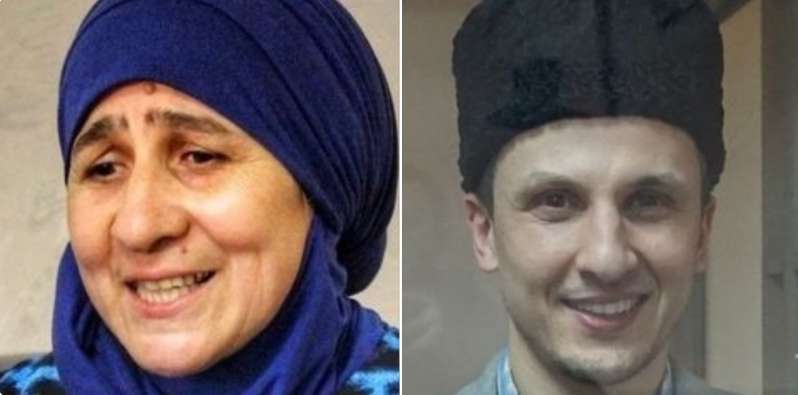• Topics / Human Rights Abuses in Russian-occupied Crimea
Mother of Crimean Tatar prisoner of conscience prosecuted for solitary picket in his defence

The Russian-controlled police in occupied Crimea have initiated administrative proceedings against Venera Mustafayeva after she stood on the street alone, with a placard reading “Conversations in a mosque are not a crime – bring back my son”. Server Mustafayev and six other civic journalists and activists were sentenced the following day to horrific terms of imprisonment, without any crime and on the basis of flawed claims about illicitly taped, and entirely innocuous, conversations in a mosque.
Even according to the repressive legislation which Russia is illegally applying in Crimea, single-person pickets are allowed, with no prior notification required. Yet one of the two charges brought against Venera Mustafayeva is for the supposed ‘organization or holding of a public event without submitting the legally established notification’ (Article 20.2.2 of Russia’s code of administrative offences). The other charge is under 20.6.1 and claims that a single-person picket, which, by definition, involves distance from others, infringed the rules linked with the state of heightened risk due to the threat of an emergency. Russia has been using the pandemic as an excuse to prevent the last remaining possibility for people in occupied Crimea or Russia to peacefully voice their protest. Venera Mustafayeva now faces a fine of from 1-30 thousand roubles or a warning, with respect to 20.6.1 and a fine of from 20-30 thousand roubles; community work for up to 50 hours; or administrative arrest for up to 10 days, over 20.2.2.
Crimean Solidarity has seen the document Mustafayev’s mother received after being summoned to the police on 22 September, and notes that the police are using an article about the picket on Krym.Realii as ‘material evidence’.
It is impossible to understand the brutality of such a prosecution. First Russia imprisons Server Mustafayev, Crimean Solidarity Coordinator; civic journalist, and Amnesty International prisoner of conscience, for his refusal to remain silence in the face of mounting repression. Then it targets his mother who quietly stood in protest , pleading for her son’s release.
Mustafayev was arrested in what was, back on 21 May 2018, the most flagrant attack to date on the civic initiative Crimean Solidarity, and on its civic journalists and activists
Six Crimean Solidarity journalists and activists were arrested earlier, on 11 October 2017: well-known volunteer, philanthropist and civic journalist Suleyman (Marlen) Asanov; three other civic journalists: Ernest Ametov; Timur Ibragimov and Seiran Saliyev; Memet Belyalov and Server Zekiryaev, both of whom had actively sought to help political prisoners and their families. Then on 21 May 2018, the FSB came for Crimean Solidarity Coordinator Server Mustafayev and Edem Smailov.
All of the men and their families were subjected to terrifying armed searches which found nothing ‘incriminating’, and left small children deeply traumatized.
The charges against the men, under Russia’s ‘terrorism’ legislation, were based solely on unproven allegations of involvement in Hizb ut-Tahrir, a peaceful Muslim organization which is legal in Ukraine. Russia is using a flawed, secretive and baseless Supreme Court ruling from 2003 which declared Hizb ut-Tahrir ‘terrorist’ as its excuse for imprisoning men for up to 24 years without any crime at all. Since 2015, it has been illegally using such repressive methods in occupied Crimea.
It is also now clear that the Russian FSB are targeting Crimean Solidarity and Crimean Tatars in general, and are overtly seeking to intimidate Crimean Tatars and to present them as dangerous ‘terrorists’ and ‘extremists’.
All of this has been repeatedly stated by the Russian Memorial Human Rights Centre which has declared all of the men to be political prisoners. After further arrests in March 2019, Human Rights Watch issued a statement, saying that “the sweeping arrests in Crimea aim to portray politically active Crimean Tatars as terrorists as a way to silence them,” Freedom House and Civil Rights Defenders called the arrests “yet another serious abuse of power by the de facto authorities, transparently aimed at striking fear into a community that has suffered severely during Russia’s occupation of Crimea”. The men were either charged with the more serious ‘organizer’ role under Article 205.5 § 1 of Russia’s criminal code, or of ‘involvement’ in such an alleged group (Article 205.5 § 2). The distinction has always seemed very arbitrary, with this essentially confirmed by the very small difference in sentences. All eight men were also charged (under Article 278) with ‘planning to violently seize power’ – with the force of their words, presumably, since no weapons were found, and no evidence of such plans presented.
On 16 September, judges Rizvan Zubairov (presiding); Roman Saprunov; and Maxim Nikitin from the Southern District Military Court sentenced Marlen Asanov - to 19 years’ imprisonment; Memet Belyalov - 18 years; Timur Ibragimov - 17 years; Seiran Saliyev – 16 years; Server Mustafayev - 14 years; Edem Smailov and Server Zekiryaev to 13 years. The sentences are all in the harshest of Russian prison colonies, and in most cases a further year or 18 months’ ‘restriction of liberty’ has been ordered. The only positive thing was the acquittal of one of the men – Ernes Ametov. Acquittals are almost unheard of in Russian courts and this was the first such acquittal in ‘Hizb ut-Tahrir cases’. While Ametov was certainly innocent, so too are all of the men. The above sentences were passed, despite no elements of a crime and without any adequate evidence even of the alleged involvement in Hizb ut-Tahrir, let alone of the supposed plans to violently seize power.
Now they are going for Mustafayev’s mother, for protesting such a monstrous injustice.





